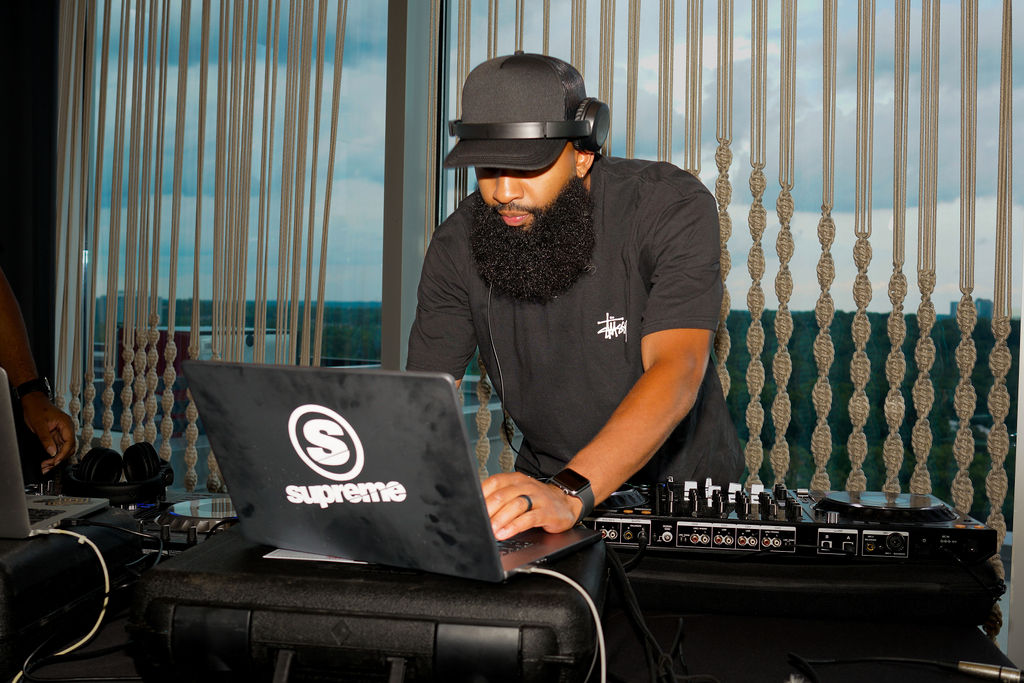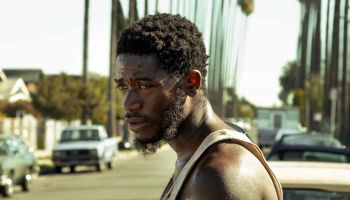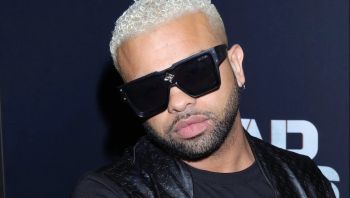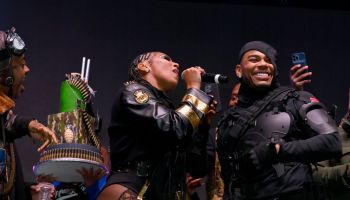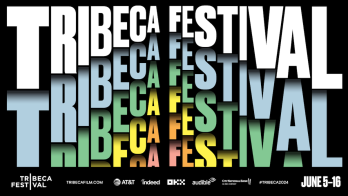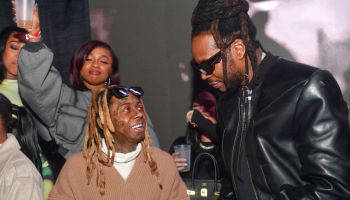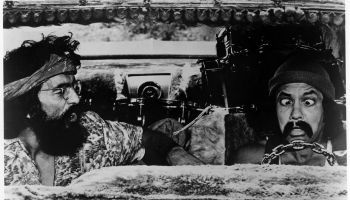Imagine you had traveled through the rural villages, banana plantations and paramilitary camps of Central America by bike; walked across hot coals and chanted with a shaman; learned the secrets of Rastafarianism in the hills of Jamaica and called both Montreal and Marrakesch, home.
How would you condense all of that into a 3-minute dancehall-based, radio-friendly pop anthem with a message? “I’m the daughter of a scientist,” says Montreal’s Female Hip Hop Artist of the Year, Empire Isis, née Miriam Moufide, which definitely explains the alchemy involved in building her career.
That strategic implementation of science and magic could explain how Isis is as comfortable talking shop in a room of environmentalists as she was on stage at last year’s Black Arts Festival in Senegal. Her grit-pop girl power soundtracks everything from Cover Girl commercials to “Khloe and Lamar.”
The Welsh-Moroccan 6-footer is a former aspiring documentary filmmaker, linguist (she speaks French, English, Spanish, Portuguese, and Wolof), traveler, performer, songwriter, music exec, environmentalist and certified globalist. She’s also, full disclosure, one of my best friends on earth.
I caught up with Isis on Skype to talk travel, race and the road that’s lead her here, to the release of her fourth album, “Crack the Code.”
Tell me about your new album, “Crack the Code.”
I’ve always talked about power and strength, but I realized after the last album that people wanted to know how I love, how I feel. Me on an emotional level or me in a not winning scenario. I’ve shared alot of that on this album and it was haunting, in a way, to do and now to hear it … it’s cemented forever. My favorite songs on “Crack the Code” are [haunting, bouncing, piano confessional] “Permanent Stranger” and “SOS to Freedom.” I wrote “SOS to Freedom” for the anti-human trafficking campaign. I’m going to be shooting a short film for campaign soon.
What’s behind the name of the album?
Crack the code is how I live; it’s how I move everywhere. Everywhere you go there’s a different way, a different vibe. People are programmed culturally, linguistically, religiously … so you might not always know the elements of a culture, but you can crack that code and connect regardless. More than anything, it’s understanding that we live in this global village. We’re all affecting each other and yet we still have this totally individualistic way of looking at ourselves. We think that we’re not interdependent and as all these natural disasters show us, tsunamis and nuclear meltdowns and polar ice cap melts, we are. You know, look at Bolivia, where [President Evo] Morales just gave Mother Nature the same rights as human beings.
[pagebreak]
So what can Mother Nature do now that she couldn’t before?
Now in Bolivia, Mother Nature can take mining companies to court and sue them. This is the philosophy that I was shaped in. I was shaped by a lot of indigenous thought, through my travels.
Let’s talk about the travels that have inspired you the most, the travels that have shaped you.
There are four places that truly radically marked me in my life. First, my time in Brazil, Venezuela, and Colombia with the Rainbow Caravan for Peace. Being in this region had a deep effect on my jungle woman; on my survival skills, living in alternative and indigenous communities. Those are the first places that I really got into doing music and theater and walked on stilts and spit fire. I was like a circus freak. But also I was moving with this hardcore group of permaculturists and ecological revolutionaries. I just got booked to perform at the 20th Congress of the Global Eco-Village Network in Mexico, the cutting edge of ecological warriors on earth.
You know what a deep effect Jamaica has had on me. I thought I was a documentary filmmaker back then and I decided to get footage for a film about the [Rastafarian fundamentalist] Bobo Shanti because no Jamaicans could tell me who they were. So I ended up in this black supremacist community with my camera and this huge thick 50 pound belt slung around my waist for lighting. Mind you, you’re on Bobo Hill: everywhere you go it’s a hill! It was quite a sight. Jamaica is the place where I officially realized the whole Empire Isis thing.
Before that you had never thought about being a musician?
Not fully or seriously. In Jamaica, I was always free styling, always talking, always in a reasoning session. It was really there with [Roots reggae luminary] Sizzla Kalonji and his warriors (that’s who I hung out with all the time, the Judgement Yard boys) and they were just like, “You’re a star and you should rock the mic.”
[pagebreak]
What was the third place?
Mexico, in the desert and the Tezpotlan Alternative community, an hour and a half south of Mexico City. I lived with the Zapatistas in the Chiapas base military camp. I mean, they took my passport, and I had to stay there for 10 days. It was really crazy. It really made me feel like I was [Cuban revolutionary poet] Jose Marti or Fidel Castro….
So Mexico fed your whole revolutionary side?
What Mexico did was it solidified the fact that I could do anything. I bicycled through 7 countries to get there.
You bicyled through 7 countries and ended up in Mexico…
Yeah. Starting in Panama. I took the long way through the Caribbean. I paid dearly for not going the straight route…
Which would’ve taken half the time.
We went through all these banana plantations where there were no roads. Picture us riding down a stone path, banana plantations on either side, filled with worker men with no shirts on, swinging machetes, and us in spandex on bikes.
Quite a visual. I hope padded spandex…
More recently, Senegal has overtaken everything in the my life. In Senegal I became a follower of Sufism and I’ve left Rasta behind. I’m such a hyper, “in your face” warrior, I like being around gentle warriors who remind me to be calm.
[pagebreak]
How much of your attraction to Africa stems from your father being Moroccan?
When I was a little girl, before my parents split up, I remember my dad used to read me stories, like Ali Baba and the 40 Theives. So I grew up with an African background. When we came to Canada as immigrants, we were surrounded by Africans. Then my mom remarried to a Ugandan, and he and I are very, very close. We used to eat uji, ugali and maandazi… I was always surrounded by African art–statues, djembes…I don’t know if it’s that that made me love Africa how I love Africa right now.
Tell me about the music scene in Montreal. Especially the hip hop dancehall scene, where you fit in it, and where you don’t…
We’re most known for indie music. Arcade Fire just won the Grammy this year. Electronic music also has deep roots in Montreal. So, Ninja Tune, Tiga, and Chromeo are all from here…we’re much more known for that. I guess I’m part of the urban scene. It’s not easy when people who look like you wouldn’t necessarily do that type of music. I’m used to that after Jamaica– and everywhere else! So I just came back to Montreal and just took my place. Now people are just used to me. I’m Isis.
[pagebreak]
What do you think about the whole Diplo controversy, where DJ Venus Iceberg called him a “music colonist” for basically stealing music from people of color, putting a white face on it and selling it, while artists of color associated with him remain poor?
This is actually a controversy?? Oh Dips, just give me a call, man! Nah, I’ve ended up on so many documentaries about race over the years….
Really?
You didn’t see “Blacking Up”? [It’s] a documentary about white people in hip hop. I actually refused to see it, but me and MC Search are in it. I’ve been dealing with race since 2002. I discovered I was a white girl in 2002.
And before that?
I was just British Moroccan immigrant scum of Canada. Here they call me “mulattre.” You see the difference in perception?
So you think it’s all bull?
If Diplo does choose to borrow from other cultures, guess what, [it’s been happening] since the beginning of time. The Romans took all their gods from the Greeks. The Greeks took all their gods from the Egyptians. We could say this has been going on forever. The Congolese blues is down South blues with an African beat. Afropop mixes all kinds of crazy things. Reggaeton. Hip hop…
Hip hop stays cross pollinating, culturally.
I think Diplo gave style to a lot of artists that didn’t have style before. If they ain’t making money it’s because they ain’t hustling enough. It ain’t Diplo’s fault. I mean, these people have nothing to write about. I say shut up and go give a dollar to Japan.
Shots!! You’re still on your own label, right? Talk to me about how that came about.
Our label is called Monumental Records and now we’re in collaboration with Universal. Look, everything that’s ever worked in my life, I’ve built myself. I always say that I’m in the entertainment business because it’s not just about music, It’s about how you speak to the people, where you’re involved, and how people can consume your music. It’s sponsorships, it’s working with companies…it’s a lot of different things. It doesn’t just revolve around being an artist. I have executive duties every day.
[pagebreak]
Break down the difference for me between being in the entertainment industry and being in the music industry.
I relate the music business to that old model where it’s greedy, ineffective, unreal, unverifiable and completely nefarious to all content creators. It’s a world that has either shunned me because of my love for dancehall or because of my contradictions, or it’s one that has wanted to pass me rape contracts. For example, I won a bunch of competitions that came with thick contracts that in the end, asked me to give up the rights to my music. But I’m still making money off those songs that I refused to sign over ownership. Get Up On It just got in another video game today.
“Get Up On It” won the Doritos/Super Bowl competition, right?
Yep. I didn’t sign that contract. Since then that song has been placed 26 times in TV, movies, and video games. Four songs from Crack the Code have already been placed. “Manchild” on Degrassi, “Bang Bang” and “Louder” are in Cover Girl commercials, “Bang Bang” is also featured in UB Soft’s Dance Revolution and “Black Cloud” got placed in another video game today.
Any words you want to leave the people with?
I just wanna say listen to “Crack the Code.” If you wanna know how a gangstress lives, “Crack the Code” is your album.
